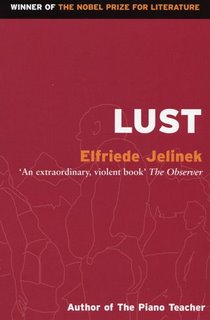
Finally finished reading Lust. It took quite an effort to do that. Both at the level of form and that of content the book is a challenge to read. Now at the end of it all, I must say I was slightly disappointed with the book. I like what Jelinek is trying to do in the book and also how she goes about doing it, but the book seemed more like a hurried rant built of trenchantly aphoristic asides, a rambling and incoherent essay on the war of the sexes told in a stream of consciousness style which never coalesces into a structured whole. It is also extremely repetitive. Same scene of rape and violence get repeated over and over like some tune in a musical piece. Perhaps that's what the Nobel academy meant when they pointed "musical flow of voices and counter-voices" in their prize citation!
Now I have absolutely no problem with novels written with a political agenda. I am not too fond of the philosophy of "art for art's sake", which as someone once said is the "philosophy of the well fed". I like books with "messages". I also don't look for story or plot in a novel, nor "psychologically well rounded" characters. I am entirely okay with political propaganda, it should just be written in a stylish and evocative prose and should be passionately argued.
I am also not a sentimental, romantic or a lovey-dovey kind of person and I am okay, in fact I whole-heartedly welcome it, when someone treats topics like sex, romance or love as subjects of political investigations and exposes fascist undercurrents, rampant hypocrisy and dishonesty beneath these supposedly noble feelings. Love as an instrument to exercise power and control? Bring it on, I say!
So it is in this context that I found Lust slightly disappointing. The book tells the "story", if it can be called that, of a Director of a paper mill who is also called "the man" who treats his employees with the same violent impunity as he treats his wife at home. The book is basically an endless series of violent and explicit rape scenes written in a cynical and evocative style. All these rape scenes are interspersed with cynical asides on how the director runs his paper mill. That is, like a true fascist autocrat. Perhaps Jelinek thinks that this gangster capitalism is the true capitalism. It is not hard to imagine why she will call bullshit if you give her a copy of Capitalism and Freedom! Or perhaps she is just trying to draw a symmetry between capitalism and marriage as they are both founded on the notion of private property, or that is what she thinks. After all these rapes the wife meets another man and has another series of brutal sexual encounters. Well, what do you expect? He is after all a man! She also has a kid but he is dirty little fascist himself who is always thinking of me-me-me and asking for presents. Even the woman is not exempt from Jelinek's contempt. She flays her for her preoccupation with her looks and perhaps for her stupidity which makes her believe the "romantic nothings" with which men exploit her body.
In the Jelinek-land all sexual relationships (or is it just the heterosexual ones?) are inherently relationship of unequals and lend themselves naturally to fascistic power play. She also doesn't think very highly, to put it mildly, of romance and related feelings. I-Love-You's for her are just "awkward nothings" that the man "slobbers into the warm earhole" of the woman while he "batters her hole between her legs". Shocked by the language? then sample this, taken randomly from the book (caution very strong language!):
The pallid bags of her breasts sag on her ribcage. Only one man and one child have ever made use of them. The Man back home ever bakes his daily impetuous daily bread anew. If your breasts hang right down on the table at dinner you can get an operation. They were made for the child and for the Man and for the child in the Man. Their owner is still writhing in her excreted fluid. Her bones and hinges are rattling with cold. Michael, racing down the slope, chomps at her privates and clutches and tugs at her dugs. Any moment now God-given sap will rise in his stem, his cup will overflow. Hurry up, stuff that prick in its designated slot, no loitering. You can hear her shrieks , you can see the whites of her eyes, what are you waiting for?
Or just a paragraph later and you can understand why one of the members of the nobel academy resigned protesting against awarding the prize to Jelinek calling her work, "whingeing, unenjoyable, violent pornography" :
The young man is suddenly alarmed at the totality with which he can spend himself without being spent. Again and again he reappears from within the woman only to bury his little bird in the box again. He's now licked Gerti from top to toe. His tongue is still tart with the taste of her piss. Next her face. The woman snaps at him and bites. It hurts, but it's a language animals understand. He grabs her head, still by the hair, pulls it up off the floor and slams it back where he first found it. Gerti splays her mouth wide open and Michael's penis gives it a thorough go...The novelty of this has worn off, unfortunately, since he did it the same way last time...An endless chain of repetitions, less appealing every time because the electronic media and melodies have accustomed us to having something new home-delivered every day...
What I liked about the book was the way in which Jelinek plays with words, it does create a slightly weird, jolting effect in the reader. But overall the book disappoints because it is extremely repetitive. She could have made her points more powerfully in an essay of few pages and it would have been more effective. But anyway I am glad I read the book, just because I had never come across anything like it before. So why should one read this book? Well, other than the curiosity value, if you are feeling desperate because of unfulfilled romantic and sexual cravings, it can offer some consolation! Also if you are pissed off with all those chick flicks and romances and think that these are seriously damaging the worldview of young and naive people, you can read it as an antidote. Also if you are a manhating feminist battling in the war of sexes you can use this book as a source of ammunition! Or like me, if you think that revelling in negativity, hatred and full-throttled cynicism and misanthropy is a nice way to spend the weekend, this book will have plenty to offer.
An article from the nobel prize site
here and a profile from
The Times of London






